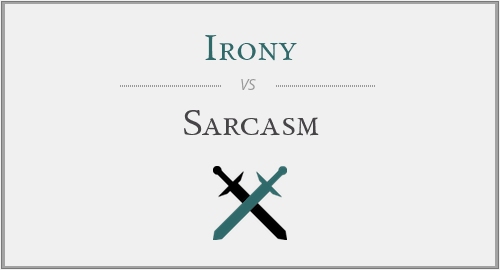
Meaning can be expressed in complex ways. We are able to create double meanings; we can say things that we don’t mean, while our meaning hides in that which is unsaid; we can communicate meaning by combining overt descriptions with covert messages; and we often use humor to say difficult things to one another.
In this article, Irony vs Sarcasm, we will define, compare, and give examples of these two ways of creating and expressing meaning.
What Is Irony?
The word “irony” was first used in English in the 16th century. It came from the Latin “ironia” and before then, from the Greek “eironeia” which both are defined as a form of ignorance that could be affected intentionally.
Today, the word “irony” is often used to describe the simultaneous presence of two opposing meanings; a situation is ironic when something is said, or something happens that is actually the opposite of what is expected.
Irony is a language device that juxtaposes a surface, overt reality to an underlying, deeper reality, sometimes using humor, sometimes using more serious means.
This is ironic because it is surprising and unexpected to find that someone who is afraid of water would have a livelihood based on immersion in water. If he was a construction worker who was afraid of water, this would not be ironic.
This is ironic because it is surprising and unexpected that this poor person must suffer a surname that is the opposite of his circumstances. If that very same poor person had the surname “Brown,” it would not be ironic at all.
This is an ironic statement because we are emphasizing our true feelings by saying the opposite of what we mean. If we say that we are scared of the wind during a tornado, this would not be ironic.
• In this ironic situation, the hero leaves his house in pursuit of his true love, believing that she has left on a plane. Meanwhile, the audience can see that she is actually on her way to his house.
In literature and in plays, irony is used in a dramatic way to show the audience the true reality while the characters, themselves, are still oblivious.
• Irony can also be found in movies, songs, and social media, where it is used to add humor that comes with a twist.
What Is Sarcasm?
The word “sarcasm” was first used in English in 1579. It is derived from the Greek verb “sarkasein,” meaning to rip or tear flesh.
In other words, sarcasm hurts.
Sarcasm is used to ridicule or mock someone and uses negative devices. Irony itself can be one way of expressing sarcasm; a laugh can be sarcastic; even a contemptuous lift of one eyebrow can convey sarcasm.
We will often find a sarcastic comment clothed in a condescending attitude or a witty but cutting tone of mockery or contempt. As such, sarcasm might also rely on tone and body language to convey its meaning.
For Example:
A person makes a remark that expresses something obvious and receives this cutting retort: “Is that so! I never knew you were such an expert!”
This comment is sarcastic and really means, “I notice that you made a mistake and I think less of you because of it.”
Comparing Irony and Sarcasm
There is one glaring difference between irony and sarcasm: irony is neutral by definition; the aim of sarcasm is to embarrass or to insult.
Like irony, sarcasm often expresses meaning by juxtaposing the overt statement with the covert meaning.
Like irony, sarcasm often uses wit and humor.
Example of Irony:
The mother’s statement is ironic because she is not enjoying herself and is unable to accomplish anything. In this ironic statement, the opposite is true: she is actually worried and preoccupied.
Example of Sarcasm:
Father says: “Let’s celebrate your successful discipline technique!”
The father’s statement is sarcastic, quite different in feeling and in intent from the mother's statement. Although on the surface, he is complimenting his wife’s parenting technique, his covert meaning is the opposite: he is actually making a nasty remark about the mother’s ability to discipline their children.
Sarcasm is often a cutting commentary about a person, their actions, their characteristics, and their beliefs.
Final Thoughts
Both irony and sarcasm are often misused and misunderstood. Often, they are mistakenly used as synonyms, which they certainly are not. On the other hand, they do have their similarities.
Consider the following:




Have a discussion about this article with the community:
Report Comment
We're doing our best to make sure our content is useful, accurate and safe.
If by any chance you spot an inappropriate comment while navigating through our website please use this form to let us know, and we'll take care of it shortly.
Attachment
You need to be logged in to favorite.
Log In